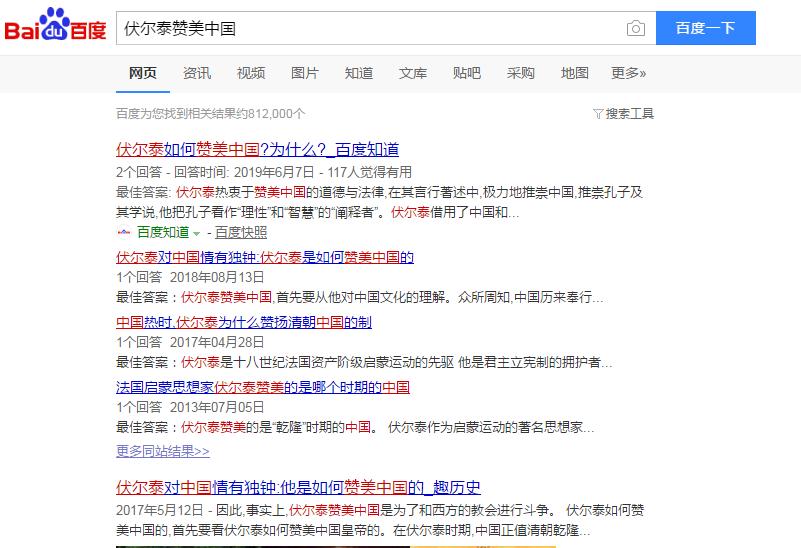In the historical circles of China's major online platforms, there is such a "good story": Voltaire, a famous French philosopher of enlightenment, actually has a special love for Chinese culture! With just a few keywords on Baidu, we can find a large number of articles about Voltaire and Chinese culture, which is enough to show how widely Voltaire's remarks about China are spread.

As a foreign intellectual who was full of poetry, full of thoughts, and full of economy, Voltaire admired Chinese culture to a jaw-dropping point. The Chinese political system satisfies Voltaire's preference for an enlightened monarchy, and he believes that Chinese law is "the empire is a family, and public utilities are regarded as the primary obligation", which is in line with natural law; he regards Confucius as an interpreter of reason and wisdom, "Confucius is a true saint, he regards himself as a pure and high, he is the legislator of mankind, and never deceives mankind, Voltaire believes that Confucianism is a moralized religion of reason, and confucian "benevolence" and "tolerance" are compared to western cultures that constantly persecute pagans. Be much stronger;
Voltaire also praised Qianlong, who seems to have poor governance ability in modern times, not only as an enlightened monarch, but also as a great poet, who even claimed to have written letters to the Chinese emperor; Voltaire even wrote an adapted play based on the Yuan Dynasty miscellaneous drama "Orphans of Zhao", which caused a sensation in France.
Obviously, showing Voltaire's praise for China can arouse our nationalist feelings, but everything is most afraid of seriousness, and when we carefully examine Voltaire's remarks, we will find that Voltaire has added a lot of imagination and distortion that is not in line with real history. Many of these imaginations and distortions were deliberately carried out by Voltaire, because he hoped to use China's history to pinpoint the current politics of Europe.
Voltaire
In his book "On Customs", Voltaire introduced the late Yuan uprising in China. However, Voltaire did not, as Chinese, attributed the cause of the uprising to the problem of foreign rule, but to religious conflict: "The emperor indulged in female sex, favored the lama priests, aroused the resentment of his people, and the monks who were enemies of the lamas were the first to attack." Most interestingly, he also sees Zhu Yuanzhang as a Buddhist who revolted against religious persecution: "An adventurer who was originally a monk's temple worker took a few robbers and established himself as the leader. ”。
Voltaire's book The Theory of Customs introduces various styles of non-Western civilization, but there are many distortions in them
Voltaire's distortion had his own purpose: he wanted to indict France's religious oppression by analogizing the late Yuan uprising to France's Huguenot Wars. The reason for the Huguenot Wars was because the French Protestants (also known as Huguenots) had been oppressed by the dominant religious Catholic Church, and thus revolted. Voltaire was well aware of the cruelty of this religious war, so he used the metaphor of the uprising at the end of the Yuan Dynasty.
The Huguenot War is a historical trauma in France, pictured in the "Night of St. Bartholomew" in which Catholics slaughtered Protestants
In Voltaire's description of the Qing government, we see an enlightened monarchy with limited imperial power and rights and freedoms for commoners: "People were allowed to write on the tables in the palace what they thought should be condemned in the court." "People's lives, reputations and property are protected by law, and although sometimes the monarch may abuse his power to harm the minority with whom he knows, he cannot abuse his power to harm the majority of the people whom he does not know and who are protected by law." ”
This is not at all like a description of The Ming and Qing society! It is well known that China's absolute monarchy reached the peak of feudal society during the Qing Dynasty. Not only did there not exist a table in the imperial palace for people to place their opinions, but all the high-ranking officials also had to regularly submit folds to the emperor for peace; the people's rights and freedoms were even more nonsense, how rampant the Qing Dynasty's literary prisons and ideological control were, and how many intellectuals in the Weeping Temple, Tonghai, and Jiangnan Song cases were persecuted by the Qing government.
The prison of writing reached its peak in the Qianlong era, but Voltaire praised Qianlong
The monarchy of the Qing Dynasty was by no means enlightened, but Voltaire himself had a fondness for enlightened monarchies, and he wrote a book called The Age of Louis XIV, dedicated to praising the Sun King who pushed the absolute monarchy to the peak, so his purpose of making unfounded speculations about Chinese society was also clear: he wanted to use China as a model for an enlightened monarchy to promote his political ideas.
The Sun King, Louis XIV, was a French monarch whom Voltaire liked very much
In summary, Voltaire is indeed quite interested in Chinese culture, but his interest is only a shallow taste, in many specific topics about Chinese culture, Voltaire's remarks can be described as full of loopholes; and the reason why Voltaire touted Chinese culture is that he set China as a model, thus opening the way for the promotion of his own political ideas, so he did not hesitate to distort the actual situation in China.
This headline number has long updated articles about world history, if you like it, just like it or add a follow!